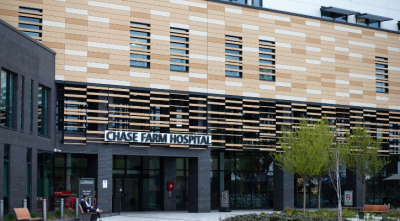Breast reconstruction surgery is a medical procedure that rebuilds a woman's breast(s) after a mastectomy (the surgical removal of one or both breasts) or significant breast tissue loss due to trauma or congenital abnormalities.
This procedure aims to restore the shape, appearance, and symmetry of the breast(s) and can help improve the psychological and emotional wellbeing of women who have undergone breast cancer treatment or experienced breast-related health issues.
The Royal Free Hospital offers a wide range of medical services, including breast reconstructive surgery from a specialist team of renowned plastic and reconstructive surgeons.
Our specialist team of plastic surgeons provide breast-conserving surgery using oncoplastic surgical techniques, breast reconstruction, and complex cancer and revisional reconstructive surgery.
We routinely perform autologous breast reconstruction with the DIEP flap, TUG flap and LD flap. We are also one of the few centres in the UK that performs the lymphatic microsurgical preventive healing approach,.
We receive referrals via primary care GPs, emergency departments (A&E), and internal and external referral routes.
Breast reconstruction awareness group
The London breast reconstruction awareness group (L-BRA) is a patient group set up by our plastic and reconstructive surgery department, providing information and support for women undergoing breast reconstruction as part of their treatment for breast cancer.
The group is an opportunity for women awaiting reconstructive surgery to meet other women who have already had breast reconstruction in a relaxed and informal setting.
Coming into hospital for surgery can be a daunting experience, particularly with a recent breast cancer diagnosis. The L-BRA evenings aim to demystify the process and introduce patients to other women who are going through the same experience and to those who have completed their reconstructive journey.
Typically, the evening begins with a brief introduction to the types of breast reconstruction and then a more detailed description of what to expect during your time in hospital.
You will meet members of the breast reconstruction team including our specialist nurses, who will demonstrate some of the equipment such as the warming blanket you may be given immediately following surgery.
There will be past patients present who have had differing types of breast reconstruction surgery, as it is important to recognise that not all patients are suitable for all types of breast reconstruction.
The second part of the evening is a ‘show-and-tell’ format where women have the opportunity to meet and talk to the women who have completed their breast reconstruction.
There is ample opportunity to ask questions both of the previous patients and of the clinical team in a relaxed setting.
Meetings are held in clinic four on the 1st floor of the Royal Free Hospital every six to eight weeks.
Due to the format of the evenings, the L-BRA meetings are for women only. Patients are encouraged to bring along a female relative, friend, or partner for support.
2025 meeting dates
Meetings will be held from 6 to 8pm on the following dates:
- 18 March
- 24 April
- 3 June
- 24 July
- 9 September
- 23 October
- 25 November
For more information, please call 0207 794 0500 ext 37534 or email rf-tr.
Breast reconstruction options
We provide a full range of breast reconstruction options. Your breast surgeon will advise whether the surgery can be performed as part of your mastectomy, or at a later date. For example, when you have finished chemotherapy for breast cancer.
An example of the breast reconstruction options we provide are:
- artificial breast implants, made of silicone gel or saline (sterile salt water)
- breast mound implants, made from your own body or breast tissue
- a combination of artificial breast implant and body tissue reconstruction
Choosing the right breast reconstruction option for you
Our oncologists will discuss the most appropriate breast reconstruction option for you. There are benefits and drawbacks to each type of breast implant, depending on your personal circumstances.
For example, an artificial breast implant is the simplest form of breast reconstruction, but can cause long-term issues because the implant is unknown to your body. It is also not suitable for patients who will require radiotherapy following their treatment.
Tissue reconstructions will leave you with two scars, but will feel more natural.
 Translate
Translate



